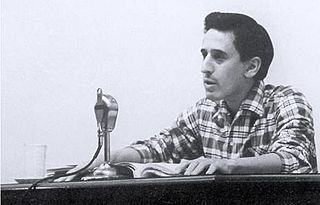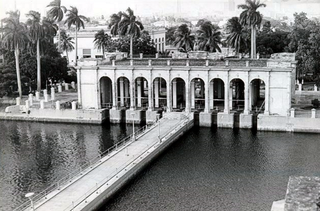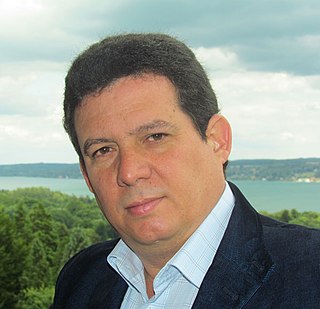Related Research Articles

José María Andrés Fernando Lezama Lima was a Cuban writer, poet and essayist. He is considered one of the most influential figures in Cuban and Latin American literature. His novel Paradiso is one of the most important works in Spanish and one of the best novels of the 20th Century according to the Spanish newspaper El Mundo.

Guillermo Cabrera Infante was a Cuban novelist, essayist, translator, screenwriter, and critic; in the 1950s he used the pseudonym G. Caín, and used Guillermo Cain for the screenplay of the cult classic film Vanishing Point (1971).

Roque Antonio Dalton García, born Roque Antonio García, better known as Roque Dalton, was a Salvadoran poet, essayist, journalist, communist activist, and intellectual. He is considered one of Latin America's most compelling poets. He wrote emotionally strong, sometimes sarcastic, and image-loaded works dealing with life, death, love, and politics.

The Almendares River is a river that runs for 47 km in the western part of Cuba. It originates from the east of Tapaste and flows north-west into the Straits of Florida. The river acts as a water supply for Havana.

Ana Maria Machado is a Brazilian writer of children's books, one of the most significant alongside Lygia Bojunga Nunes and Ruth Rocha. She received the international Hans Christian Andersen Medal in 2000 for her "lasting contribution to children's literature".
Nancy Morejón is a Cuban poet, critic, and essayist. She was a recipient of the Struga Poetry Evenings Golden Wreath Award. She is "the best known and most widely translated woman poet of post-revolutionary Cuba".

Daína Chaviano is a Cuban-American writer of French and Asturian descent. She has lived in the United States since 1991.
Latin American literature consists of the oral and written literature of Latin America in several languages, particularly in Spanish, Portuguese, and the indigenous languages of the Americas. It rose to particular prominence globally during the second half of the 20th century, largely due to the international success of the style known as magical realism. As such, the region's literature is often associated solely with this style, with the 20th century literary movement known as Latin American Boom, and with its most famous exponent, Gabriel García Márquez. Latin American literature has a rich and complex tradition of literary production that dates back many centuries.

Cuban literature is the literature written in Cuba or outside the island by Cubans in Spanish language. It began to find its voice in the early 19th century. The major works published in Cuba during that time were of an abolitionist character. Notable writers of this genre include Gertrudis Gomez de Avellaneda and Cirilo Villaverde. Following the abolition of slavery in 1886, the focus of Cuban literature shifted. Dominant themes of independence and freedom were exemplified by José Martí, who led the modernista movement in Latin American literature. Writers such as the poet Nicolás Guillén focused on literature as social protest. Others, including Dulce María Loynaz, José Lezama Lima and Alejo Carpentier, dealt with more personal or universal issues. And a few more, such as Reinaldo Arenas and Guillermo Cabrera Infante, earned international recognition in the postrevolutionary era.

Daniel Chavarría was a Uruguayan revolutionary, writer and translator, who lived in Cuba since the 1960s. He had a son with Dora Salazar, Daniel Chavarria, and raised his sister.

The Acueducto de Albear is the name of a water supply system of the city of Havana, Cuba, built in the 19th century by Francisco de Albear.

Karla Suárez is a Cuban writer.
Alfredo Miguel Aguayo Sánchez was a Puerto Rican educator and writer. He studied and lived in Cuba, and was a professor at the University of Havana. His teachings and his written works molded several generations of Cubans.
Luis López Nieves is Puerto Rican author.

The University of Havana is a university located in the Vedado district of Havana, the capital of the Republic of Cuba. Founded on January 5, 1728, the university is the oldest in Cuba, and one of the first to be founded in the Americas. Originally a religious institution, today the University of Havana has 15 faculties (colleges) at its Havana campus and distance learning centers throughout Cuba.
Latino literature is literature written by people of Latin American ancestry, often but not always in English, most notably by Mexican Americans, Puerto Ricans, Cuban Americans, and Dominican Americans, many of whom were born in the United States. the origin of the term "Latino literature" dates back to the 1960s, during the Chicano Movement, which was a social and political movement by Mexican Americans seeking equal rights and representation. At the time, the term "Chicano literature" was used to describe the work of Mexican-American writers. As the movement expanded, the term "Latino" came into use to encompass writers of various Latin American backgrounds, including Mexican, Puerto Rican, Cuban, and others.
Margot Rojas Mendoza was a Cuban pianist and teacher of Cuban-Mexican origin. She performed as a concert pianist in New York, Mexico and Cuba for several years before turning to teaching. Several of her pupils became distinguished musicians.
Pedro Pérez Sarduy is an Afro-Cuban writer and broadcaster, who has published poetry and fiction, in addition to journalism. He gives lectures and reads his work at academic institutions internationally and is currently resident in London, UK.
Ana Andrea Cairo Ballester was a Cuban writer, researcher, and professor of literature and philology.

Amir Valle Ojeda, is a Cuban journalist, literary critic and writer. In the aftermath of his criticism of the Fidel Castro regime, he was prevented from returning to Cuba in 2006. He then decided to settle in Berlin, where he continued his professional activities.